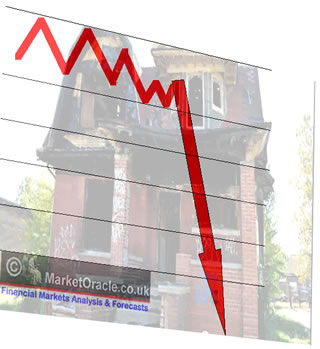The Offshored Economy, Desolate Detroit
Politics / US Politics Mar 19, 2010 - 03:35 PM GMTIn the 20th century, Detroit, Mich., symbolized American industrial might. Today it symbolizes the offshored economy.
Detroit’s population has declined by half. A quarter of the city—35 square miles—is desolate with only a few houses still standing on largely abandoned streets. If the local government can get the money from Washington, urban planners are going to shrink the city and establish rural areas or green zones where neighborhoods used to be.

President Obama and economists provide platitudes about recovery. But how does an economy recover when its economic leaders have spent more than a decade moving high productivity, high value-added middle class jobs offshore along with the Gross Domestic Product associated with them?
Some very discouraging reports have been issued this month from the Bureau of Labor Statistics. There have been record declines in both jobs and hours worked. At the end of last year, the U.S. economy had fewer jobs than at the end of 1997, twelve years ago. Hours worked at the end of last year were less than at the end of 1995, fourteen years ago.
The average workweek is falling and currently stands at 33.1 hours for non-supervisory workers.
In a major problem for economic theory, labor productivity or output per man hour and labor compensation have diverged markedly over the last decade. Wages are not rising with productivity. Perhaps the explanation lies in the productivity data. Susan Houseman found that U.S. labor productivity statistics might actually be reflecting the low wages paid to offshored labor. An American company with production in the U.S. and China, for example, produces aggregate results in labor output and labor compensation. The productivity statistics thus measure the labor productivity of global corporations, not that of U.S. labor.
Charles McMillion has pointed out that unit labor costs actually fell during 2009, but that non-labor costs have been rising throughout the decade. The rise in non-labor costs perhaps reflects the decline in the dollar’s foreign exchange value and the increased dependence on imported factors of production.
Economists and policymakers tend to blame auto management and unions for Detroit’s fall. However, American manufacturing has declined across the board. Evergreen Solar recently announced that it is shifting its production of solar fabrication and assembly from Massachusetts to China.
A U.S. Department of Commerce study of the precision machine tool industry has found that the U.S. comes in last. The U.S. industry has a shrinking market share and the smallest increase in export value. The Commerce Department surveyed American end-users of precision machine tools and found that imports accounted for 70 percent of purchases. Some U.S. distributors of precision machine tools do not even carry U.S. brands.
The financial economy which was to replace the industrial economy is nowhere in sight. The U.S. has only five banks in the world’s top 50 by size of assets. The largest U.S. bank, JPMorgan Chase ranks seventh. Germany has seven banks in the top 50, and the United Kingdom and France each have six. Japan and China each have five banks in the top 50, and together the small countries of Switzerland and the Netherlands have six with combined assets $1.185 trillion more than the five largest U.S. banks.
Moreover, after the derivative fraud perpetrated on the world’s banks by the U.S. investment banks, there is no prospect of any country trusting American financial leadership.
The American economic and political leadership has used its power to serve its own interests at the expense of the American people and their economic prospects. By enriching themselves in the short-run, banksters and politicians have driven the U.S. economy into the ground. The U.S. is on a path to becoming a Third World economy.
Paul Craig Roberts [ email him ] was Assistant Secretary of the Treasury during President Reagan's first term. He was Associate Editor of the Wall Street Journal . He has held numerous academic appointments, including the William E. Simon Chair, Center for Strategic and International Studies, Georgetown University, and Senior Research Fellow, Hoover Institution, Stanford University. He was awarded the Legion of Honor by French President Francois Mitterrand. He is the author of Supply-Side Revolution : An Insider's Account of Policymaking in Washington ; Alienation and the Soviet Economy and Meltdown: Inside the Soviet Economy , and is the co-author with Lawrence M. Stratton of The Tyranny of Good Intentions : How Prosecutors and Bureaucrats Are Trampling the Constitution in the Name of Justice . Click here for Peter Brimelow's Forbes Magazine interview with Roberts about the recent epidemic of prosecutorial misconduct.
© 2010 Copyright Paul Craig Roberts - All Rights Reserved
Disclaimer: The above is a matter of opinion provided for general information purposes only and is not intended as investment advice. Information and analysis above are derived from sources and utilising methods believed to be reliable, but we cannot accept responsibility for any losses you may incur as a result of this analysis. Individuals should consult with their personal financial advisors.
Paul_Craig_Roberts Archive |
© 2005-2022 http://www.MarketOracle.co.uk - The Market Oracle is a FREE Daily Financial Markets Analysis & Forecasting online publication.




